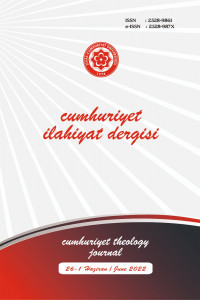Hanefî Çevreler Özelinde Kadınların Fıkıh İlmine İlgisi
Women’s Interest in the Science of Fiqh in the Frame of the Ḥanafī Circles
Author(s): Adnan HoyladıSubject(s): Gender Studies, Education, Sociology, Islam studies, Religion and science , Sociology of Religion
Published by: Cumhuriyet Üniversitesi İlahyat Fakültesi
Keywords: Fiqh; Woman; Ḥanafī sect; Fāṭima bt. Muḥammad; Fāṭima al-Sāʿātī;
Summary/Abstract: From the past to the present, women’s involvement in social life and their preoccupation with science has been a problematic issue in most societies. The Prophet Muhammad gave importance to women, who were worthless in the period of Jahiliya, in a way that could not be found in the rest of the world. The Prophet gave them the right to access social life, mosques and intellectual assemblies. First, The Prophet Muhammad forbade women to be prevented from going to mosques and even requested that women who want to come to the mosque for worship be allowed at night. Emphasizing the education of women, the Prophet ensured that they were taught to read and write. He contributed to their education by allocating a special day for women’s education. He even opened a school called Ṣuffetu'n-Nisā – a space enabling women to receive an education. After the death of the Prophet, women’s access to mosques and intellectual assemblies was increasingly restricted due to the dominant character of Arab society and the poor understanding of the Prophet’s message by some. His wife Aisha said, “If Hz. Muhammad knew what women were doing in mosques, he would have forbidden them to come to the mosque.” Her testimony shows that some women of her time believed their behaviours were not in line with the requirements of Islam. However, women who understood the message of our Prophet correctly researched various Islamic sciences. It is known that until the fourth century Hijri, many women narrated hadiths, gave lectures in Damascus Umayyad Mosque, Masjid al-Aqsa, and Masjid al-Nabī, and many male students, including the caliph, attended these lectures. It is even stated in the sources that some women went on long journeys to collect hadiths. The fact that women were considered an element of sedition, especially since the third century, prevented them from going to mosques and intellectual assemblies in the name of piety. At the same time, as the works of Greek philosophers and logicians were translated and recognized in the Islamic world, their negative ideas about women had a partial effect on Islamic scholars. On the other hand, the fact that negative judgments of the Israelite narrations about women entered Islamic sources had a partial negative effect on the views of Muslim scholars towards women. In addition, since the fourth century of the hijra, the beginning of the dominance of the Shiite Fatimids in Egypt and the Shiite Buwayhids in Iraq brought about serious changes in the social life of the Muslim community. Going out of women was the cause of disasters such as famine and epidemics, and they were restricted from leaving their homes and accessing intellectual assemblies. In the sixth century Hijri, the number of female scholars increased in the Muslim society, when the society gained stability with the Saljūq, Ayyubid and Mamlūk dominations. However, this positive picture came to an end with the Mongol invasion, which came from the east and caused great damage to all intellectual studies. During this period, many scholars lost their lives, libraries were plundered, and intellectual assemblies were disbanded. After the Mongolian invasion passed in the Islamic world, the number of female jurists, which has a fluctuating course until today, has changed according to the conditions of the time they live in. In the course of history, women’s interest in fiqh has depended on their access to knowledge and knowledge centres. Women sometimes learned fiqh through their individual efforts. Sometimes they had the chance to learn fiqh from their next of kin or husband, such as their grandfather, father, husband, or brother, who were also jurists. When the historical context is examined, it can be seen that the number of female jurists in every period is less than that of men. In this case, the biggest factor is the responsibilities within the family, such as housework and childcare imposed on women by society. Women had to devote most of their time to accomplishing these tasks. In Muslim societies, it is important for women to learn Islamic law/fiqh according to their own school of law so that they can fulfil the orders of the religion. In this sense, although women did not fall behind in the education of fiqh, they remained in the background in writing books and intellectual activities.
Journal: Cumhuriyet İlahiyat Dergisi
- Issue Year: 26/2022
- Issue No: 1
- Page Range: 5-21
- Page Count: 17
- Language: Turkish

